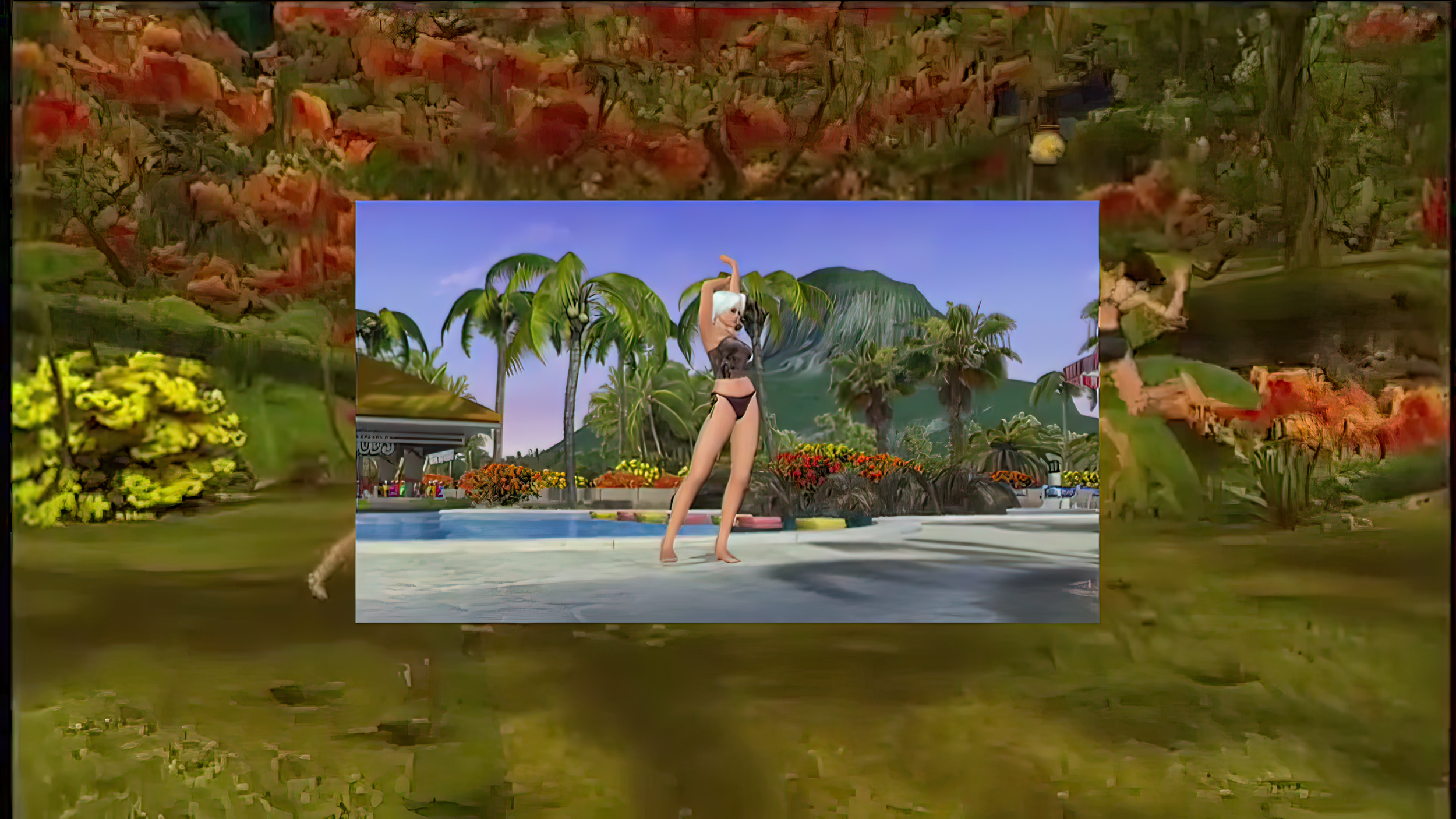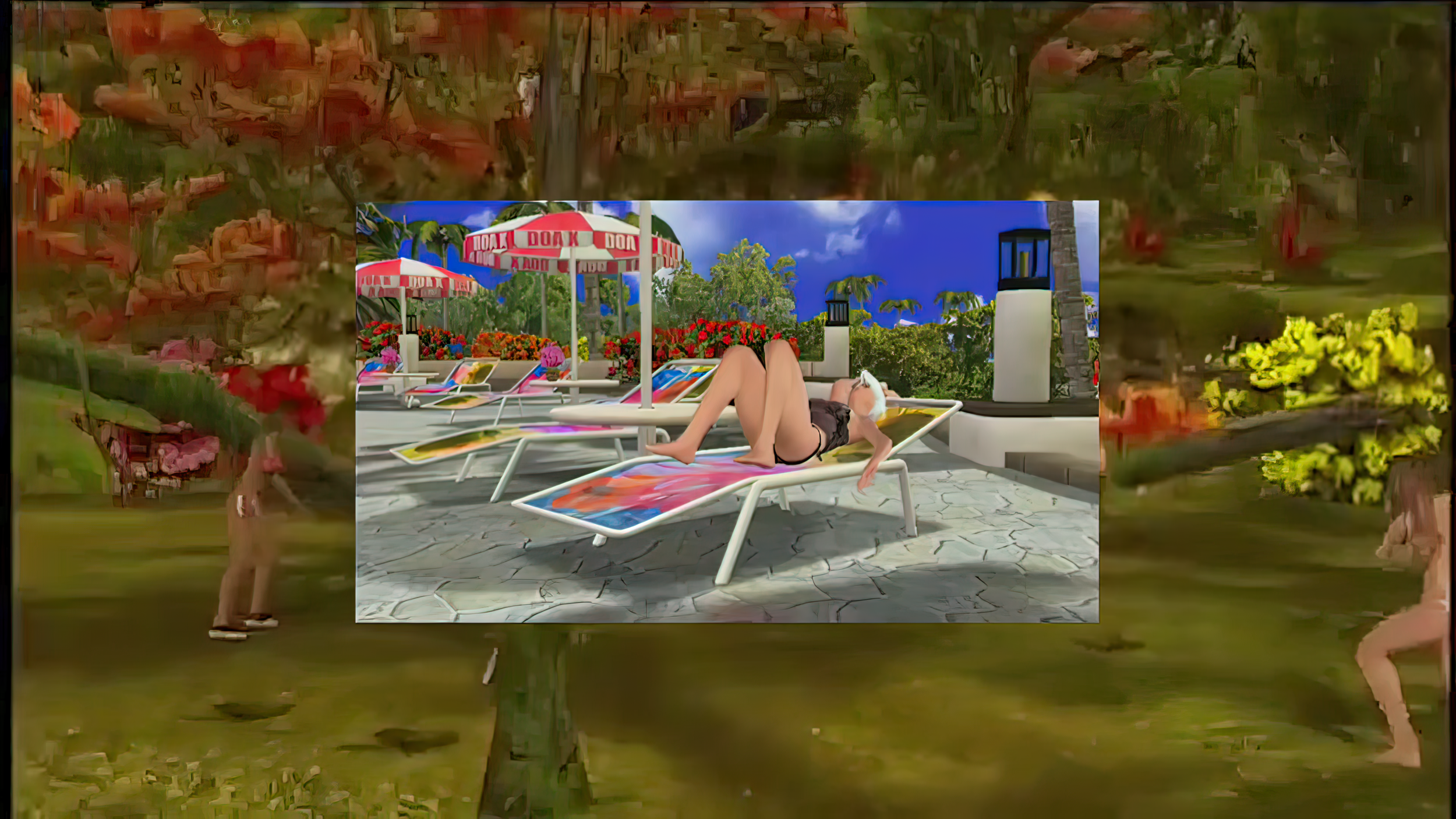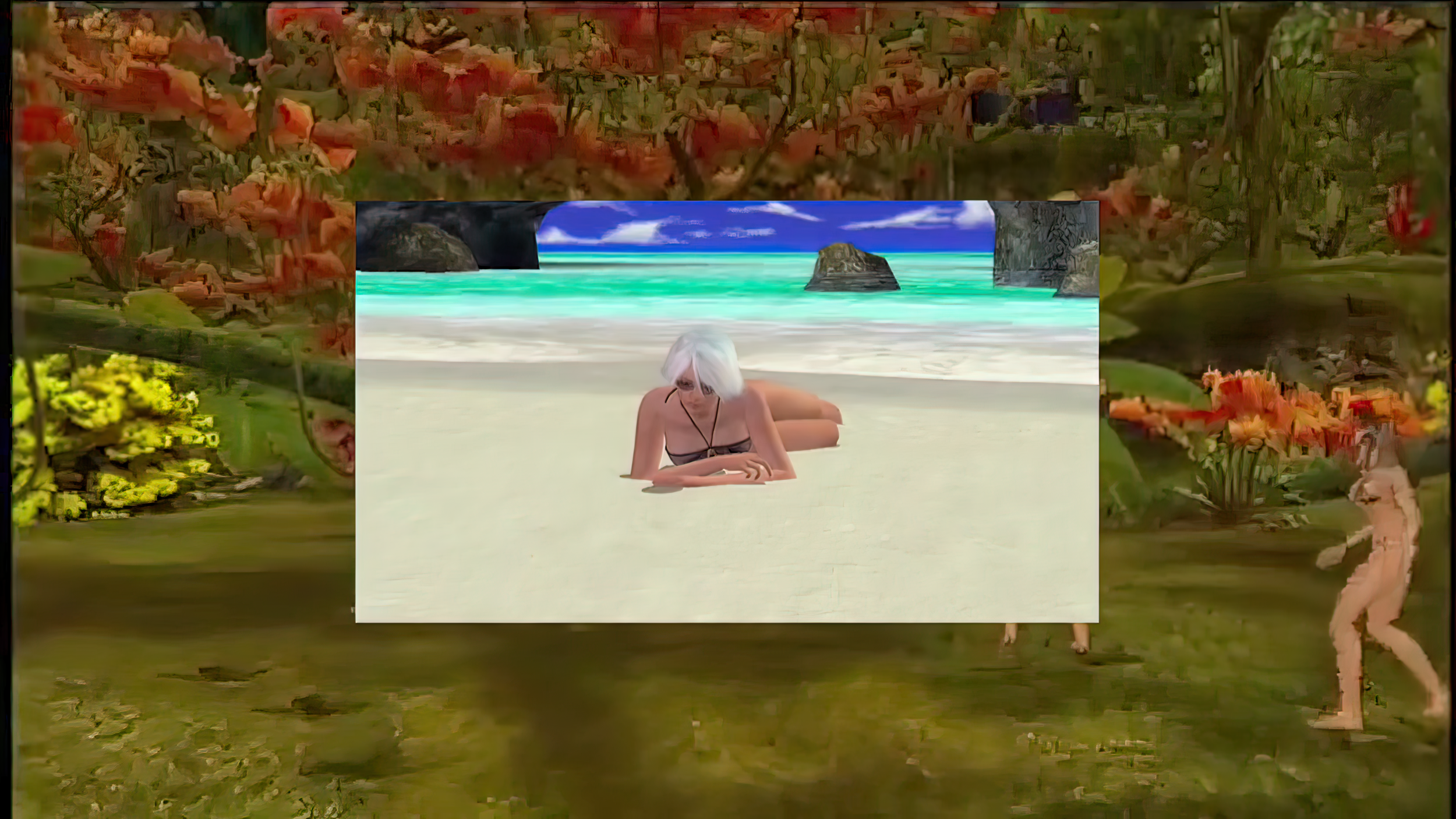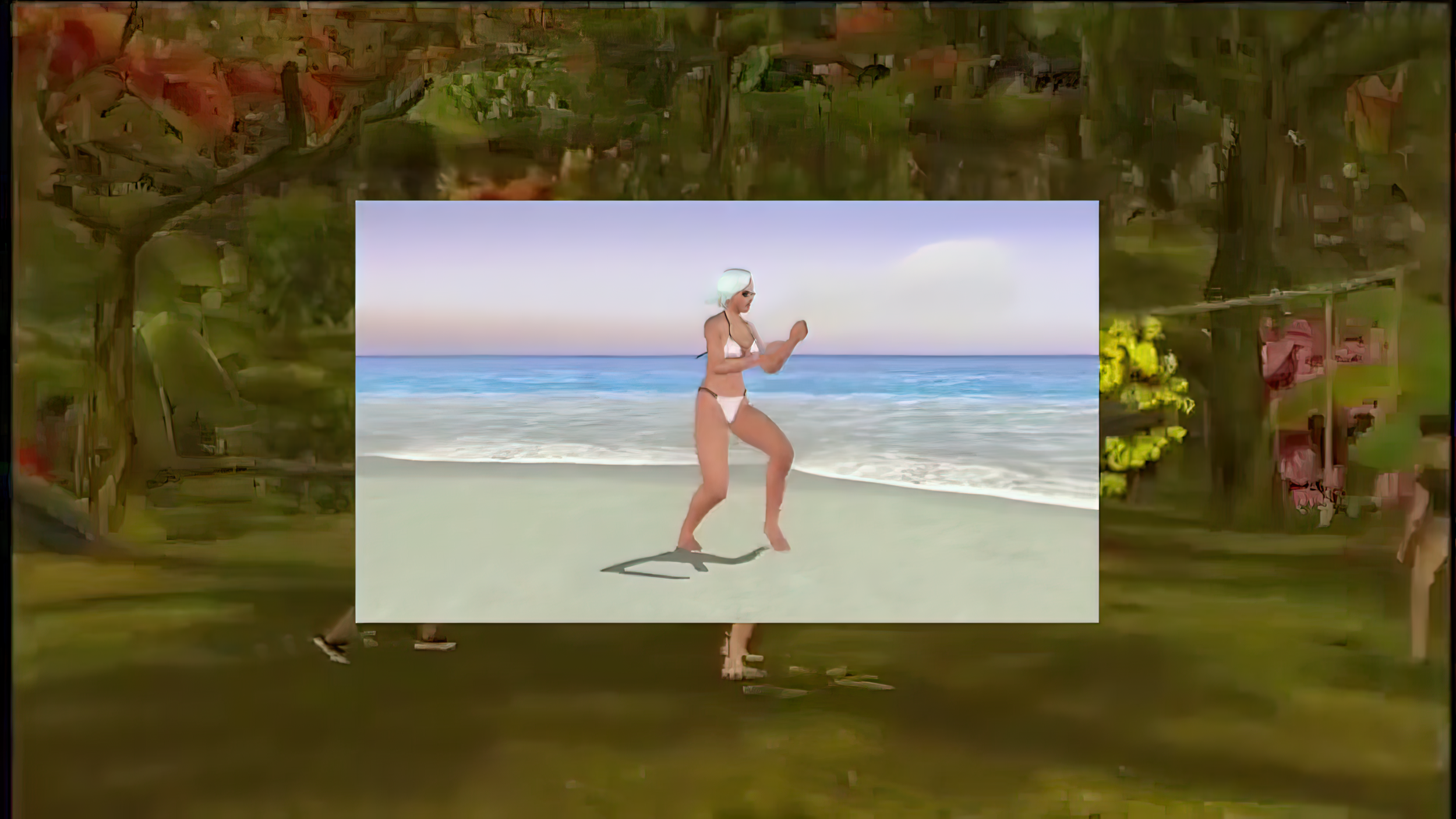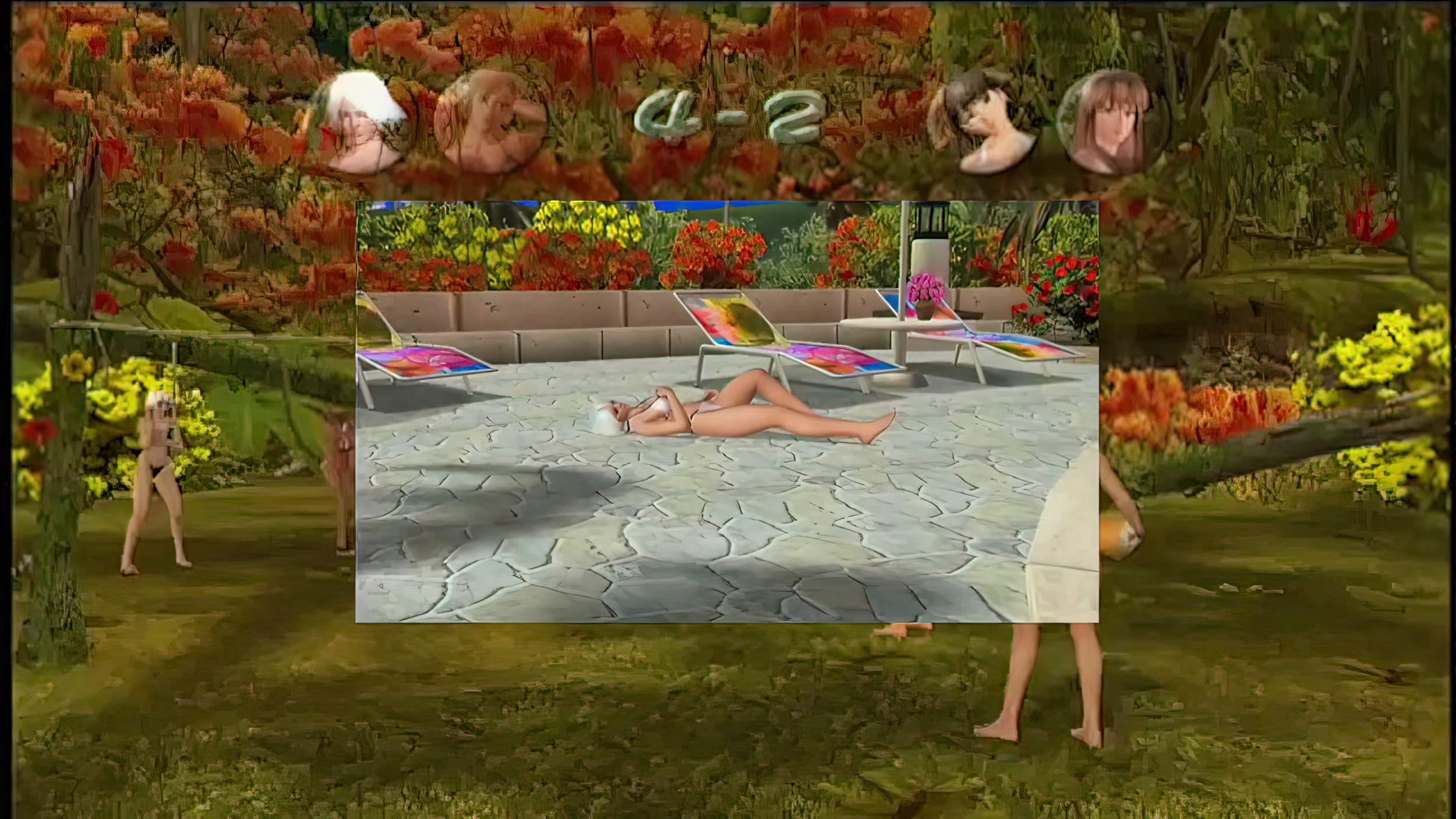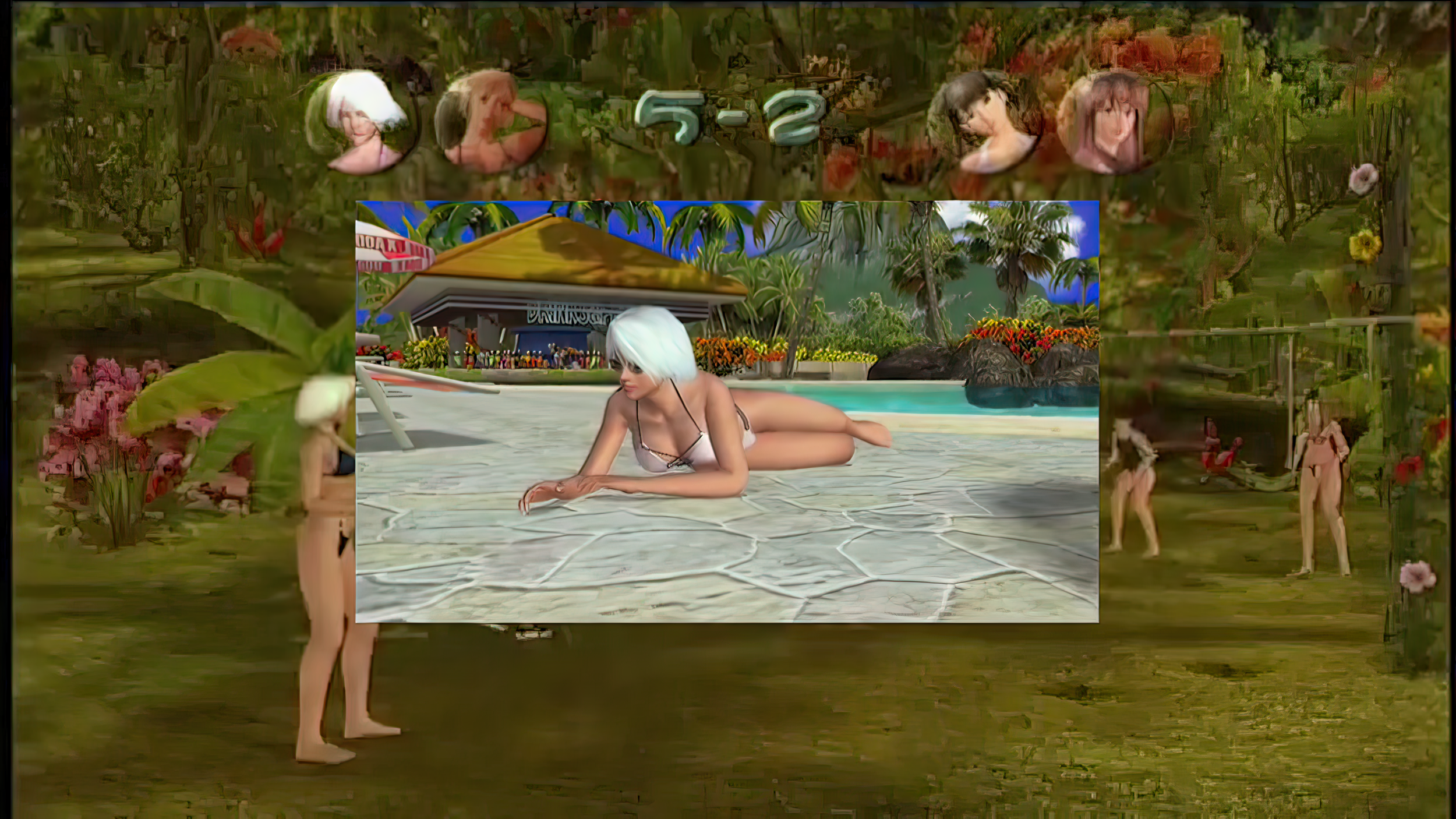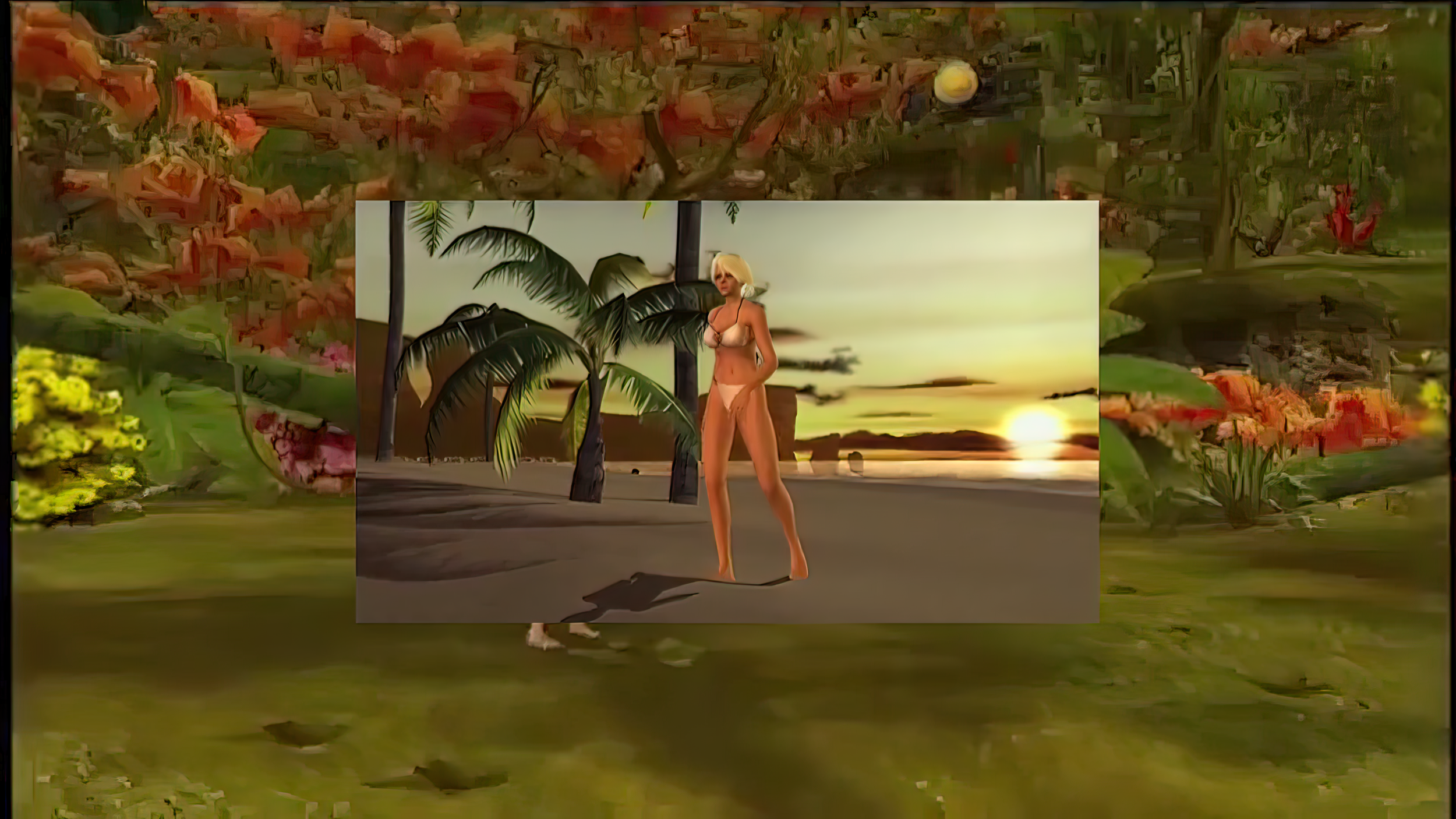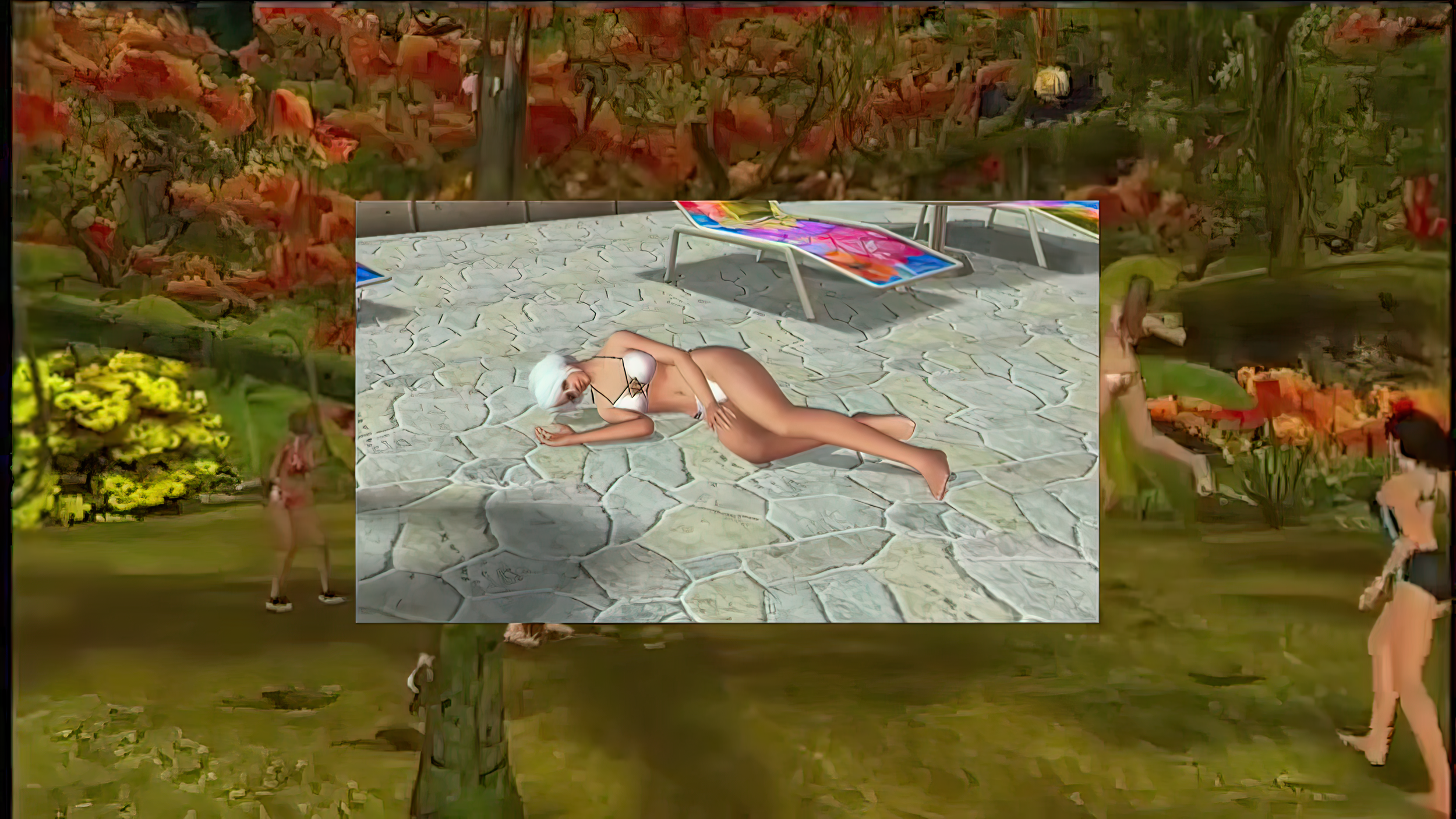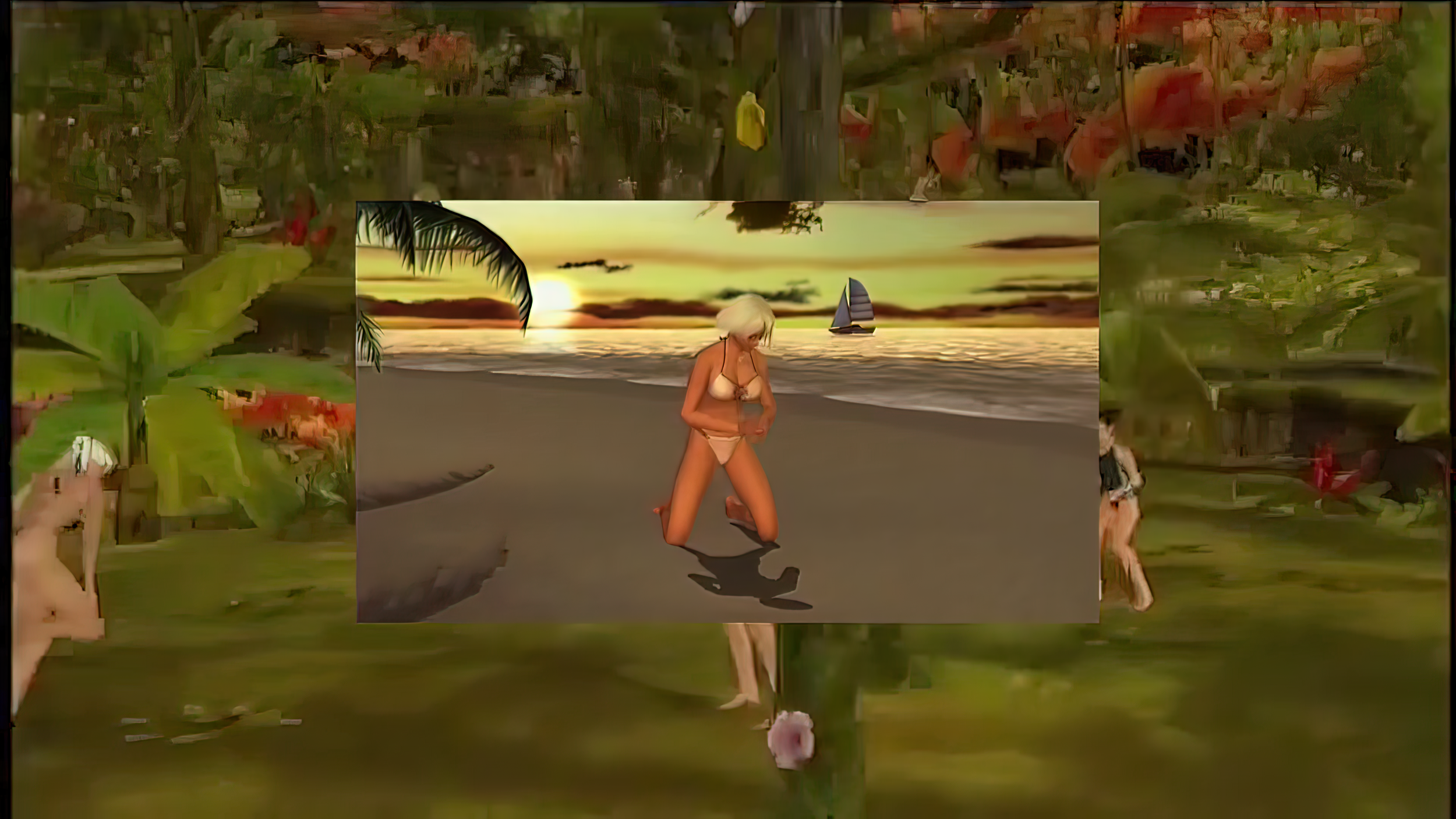OUTSOURCING (MY DESIRES TO AVATARS)
digital video (1920 x 1080), color, sound, 3’ 58”, 2021, United Kingdom
Created by Jamie Janković and Deborah Findlater
Outsourcing (My Desires to Avatars) is a machinima and experimental video created by video artist Jamie Janković and writer, poet and director Deborah Findlater. The work is part of an ongoing project addressing the intersectionality of responses to female characters in video games; formally speaking, the work is presented as an audio-visual poem, accompanied by voice over. According to Janković, this work is meant as a response to found footage material of the character Christie from the popular fighting game series Dead or Alive (1996 – ongoing). Moreover, the examination of the role of female characters in Outsourcing (My Desires to Avatars) is part of a larger project titled The identity quest series, in which the artist addresses a multiplicity of responses to female video game characters, following engagement in interviews with queer people within the gaming industry and exploring their own views on gender in game design.
Jamie Janković is a London-based filmmaker and video artist whose practice focuses on the dynamics of gender within video game worlds: in previous works, Janković has investigated the ways in which men are socially conditioned to their cultural model by visual media and explored through found footage technique how mainstream U.S. horror and sci-fi genres police masculinity through narrative and representation.
Deborah Findlater is a writer, poet, filmmaker and DJ from South London. As director, Findlater works with montage, installation and found footage in order to dissect the construction of narrative; as writer; as writer and DJ focuses on poetic qualities through its rhythmic use of voice, words and sound. Findlater artistic practice focuses on issues related to the working class, Blackness in Britain and Black Womxnhood.
Riccardo Retez: Your artistic practice is truly syncretic and Outsourcing (My desires to avatars) perfectly exemplifies your approach. You call this work “an audio-visual poem”, and yet its production required the active manipulation of video games, an interactive medium. Could you describe the origins of this project? How did this specific collaboration come to be? And what is your own personal relationship to video games?
Deborah Findlater: We met studying together at Kingston uni on the Experimental Film MA. We both thought each other was cool and banded together as fellow queers as well as folks who made socially critically collage style video work often using found footage. We also share an interest in electronic quite glitchy music which can also be linked to our neurodivergences. I would be the only or one of the few girls in a room full of boys playing video games at family houses. There was this weird realisation of women characters being objectified but also an arousal that I couldn’t express so a conflicted gaze. Then going onwards I’d game a lot as a form of disassociation but also this kinda full immersion in escapism, a trance like state. There is something in being able to put under for a while then letting your subconscious take over. With my adhd there is this ability to hyperfocus and really be taken into something for better or for worse! It’s a cool sensitivity and if channeled right can be used for good.
Jamie Janković: So I started on Kingston School of Art’s now defunct Experimental Film MA course back in late 2017 and within maybe the first month of the course I was introduced by Filipa Ramos to Lynn Hershman Leeson’s 1994 text Romancing the Anti-body, which became the genesis of the idea for my identity quest series. It details (amongst other things) one of the earliest documented examples of online catfishing; specifically an instance in 1986 in which a psychiatrist named Alex pretended to be a disabled, mute woman named Joan online and gained somewhat of a celebrity following on something called Compuserve – later becoming a scandal, nigh on cautionary tale when Joan was revealed to not actually exist, shocking and disturbing the people who had developed trusting and even intimate relations with this ‘Joan’ machination. Whilst clearly in the context of its time, there is a quote in the text – “through this experience, those who knew Joan lost their innocence” – and I couldn’t help but apply that concept to myself, someone being assigned male at birth, always playing both offline and online in games as female characters and wondering, if the faceless, bodiless, often voiceless people who I would be playing with could see the person puppeteering the character, with absolutely no context as to my experiences in life and how I frame my existence, would their responses be the same? Confusion? Shock? And I knew the reason I had played as female video game characters my whole life was so far beyond that. It was natural, logical, a natural expression and extension of my inner self, yet perhaps to the unaware virtual onlooker, this very simple almost completely unquestionable act of me playing as female video game characters could be responded to in the very same way as the reveal of Joan, and I wanted to make a series of works that updates that notion, that discourse, and provides said context I had first-hand experience with and could share earnestly and authentically, combined with knowing that I hadn’t seen or heard other works regarding this topic, so it felt like the perfect time and story for me to tell and explore.
Deborah also started on the MA at the same time as me and is both an incredible person and writer, we connected with each other and I think I had the sentence “collab with Deborah”, written down in my notebook for like a straight year after I had kept hearing her writing and watching her films and just being amazed, and then in mid-2018 I got funding from the amazing LOOP fund, and immediately knew I wanted to produce a collaborative work with her. In terms of the genesis of Outsourcing specifically, I had wanted to gather a variety of responses to female video game characters, as you mention, mainly because my own reflections and research into the psychology behind why I play the way I do led me to believe that everyone will have a different relationship to the games and the characters that I love, so why not show some footage of one of my favourite characters, Christie, to some of my amazing writer-poet mates and see what they come up with? And that was literally the exact brief for the commission; hey, watch this footage, respond however you want, here’s some money. And of course, Deborah’s writing and editing that I got back was just absolute fire, we got together and recorded it and edited it into completion in a single day, it was so much fun. The original idea was to make a work that featured my own reflections in poetry form on the character of Christie in those scenes, and then interweave two other artists’ responses, but then we finished Deborah’s piece and it felt so complete, so full and perfect and like it stood really well on its own that I decided to make that the whole thing, and then start something else afterwards, namely my most recent film, A Woman on the Internet, to speak more to my own experiences.
I am not joking or exaggerating when I say that gaming saved my life. As an autistic, trans, clinically depressed person: the combination of agency, interactivity and control you have when gaming, that you don’t find in any other medium; the control of corporeal form, especially in games where you can create your own character; the hyper-stimulation and surge of dopamine, the sense of completion; I think just the pure medium of gaming itself has helped me through some really dark times and allowed me to temporarily alleviate my existential troubles by living vicariously through the options that games I have played throughout my life have presented to me and I owe them a lot.
Riccardo Retez: Part of the poem focuses on the concept of action that specifically designates the nature of the video game medium, as opposed to traditional narrative media, where the notion of user’s agency is largely absent. Deborah’s words focus on the relationship between the avatar and the player, suggesting that the avatar operates as the player’s self. And yet, gaming’s promised freedom is yet another chimera concocted by Silicon Valley, another victim of 1990s techno utopia cults… Are video games simply another form of social conformism?
Deborah Findlater: I’d say video games are one of our biggest modern clues towards reincarnation. Life just being a game! You level up, skill up as you go along, learn how to pass each stage. There’s single player mode - your own personal destiny but also multiplayer mode as you realise you have a soul family who are working on a collective project with you. And you have multiple lives too - within this “time “ in other dimensions as well as past lives. We’re all here cos we haven’t passed the test of life and ascended - there’s been somewhere we’ve been fucking up. So like gaming you have actual unlimited goes but I’m sure on both levels - material & spiritual you get very tired and I guess become more doubtful of your ability to get through it. However there’s no option not to try and I think you have to find this balance of wisdom and childlike faith to keep on going. Unfortunately I do still feel the mainstream gaming industry does fall into the category of the question above, much like the Internet we were given big promises of freedom but, you know, same restrictions. The average person is happy to be strictly passive and a consumer rather than grabbing the ‘means of production’ for themselves or you know it’s just hard too with a lot of barriers put in our way, then corporations come in and exploit that. Gaming of course is massively tied with the military industrial complex. That said, I think it still holds so much potential but I think it requires a mental transformation from creators foremost to truly provide progressive values as well as alternative systems of gaming that divest from capitalism. I love games that require time travel and fantasy. I would definitely say it’s helped benefit my ability to enter alternate states like psychic journeying, channeling & lucid dreaming. Also grasping time as cyclical. Metaphysically and within a lot of religions like Ifa & Hinduism there’s the concept that your higher self is the one in control of your physical body - which is an avatar. Gaming taps into that higher state of consciousness so of course it’s a shame but also obvious in the current system it’s used for more harm than good.
Riccardo Retez: The poem communicates a feeling of entrapment in another body, different in nature and essence and from which it is no longer possible to separate oneself. This reminds me of the experience of the characters in Adolfo Bioy Casares’ novel The Invention of Morel (1940) in which a given form of immortality leads to the perpetual and infinite repetition of actions on the same beach. Outsourcing (My Desires to Avatars) gave me the chance to revisit such condemnation: the avatar can do nothing but repeat a set of prescribed actions just as Morel's victims can do nothing but live in the same present forever. Do you think that machinima and game-based art practices - as alternative, often oppositional, uses of the video game medium - can alter and break the pre-established schemes of the video game and the relationship between player and avatar?
Deborah Findlater: I’d say we’ve done that with this simply by interjecting and placing my voice in the mix. I’m not a willing participant.
Jamie Janković: I think there’s two ways to approach answering this question, 1) emotionally and 2) technically speaking. Technically yes, usage of things like game capture devices and recording programs can allow prospective filmmakers and artists to unlock an extra layer of a video game world by digging into what specific worlds offer, rather forensically, and capturing those experiments, perhaps reframing them into works that could almost be unrecognisable to those that play the game in its vanilla, as intended, form. This is certainly the case for Outsourcing, but this was something I had already done on an emotional level whilst playing as Christie when I was younger. I had already somewhat hijacked her as a character (playing both Dead or Alive Xtreme Beach Volleyball, from which the footage in the film was taken, as well as the regular Dead or Alive fighting game series in which she was introduced in Dead or Alive 3), by implanting my own desires onto her in a sense that she in many ways represented what I wished I was and deeply wanted to be. Her white hair, her badassery, her unrepentant villainy, her often hyper-femme aesthetic selection of outfits, her super sleek snake-like style of fighting, using her fingers to rapidly strike fatal pressure points in quick succession and slither and backflip all over the stage. She represented to me a sense of liberation, of freedom. Her hypersexualised femme fatale aesthetic, behaviour and form, to someone like me who had never been encouraged to embrace my femininity, and always yearned for it, was like a breath of fresh air, and in examining and realising this notion within myself, I thought, wow, I wonder how other people would react to this character and became fascinated by that idea. There are parts of the original game called either exhibition or gravure scenes, where the character you play as is alone in various locations around the island and simply lays there rolling around or doing activities in various, intentionally, provocative positions. I wanted to disrupt that and give the character the space to be explored, encouraging the writers I commissioned to explore how those scenes made them feel, personally, or what the character may be feeling. So yes, intentionally breaking the rules of the game, so to speak, and capturing and presenting content in a way that was not intended by the developers can offer space and the opportunity for exploration of what is contained within the game that wouldn’t be possible otherwise.
Riccardo Retez: Corporeality is a central theme in cultural studies. Such a concept is not limited to the relationship between reality and the digital, between player and avatar. To a certain extent, Outsourcing (My Desires to Avatars) stresses the fluidity of gender identity within (and beyond) the art world – I guess it is no coincidence that the work is part of a series called The identity quest series. Why did the choice of investigating the notion of identity fall on the video game medium? In your opinion, what are the opportunities for reflection that the video game provides as opposed to, let’s say, cinema or literature?
Deborah Findlater: I guess it comes down to the interactivity and illusion of creation of self. Come to think of it, gaming is probably where I first explored gender fluidity or the idea that we do share a soul with other bodies and on a higher level we choose what experience to have. And it’s fun! Despite all the material oppression we get to experience embodiment and do something with that.
Jamie Janković: There is certainly something to be said about the unique sense of agency, or at least the illusion of agency, that you are given by most video games and its ability to very rapidly feel like it has become an extension of yourself or your own imagination. Customising a character’s outfit, choosing particular dialogue options, literally controlling what a character does and where they go and how they operate – a player avatar character or even a character with a distinct aesthetic and personality, can very quickly become simply you, in video game form, and that ability to self-insert is definitely not as present in such a direct degree in cinema or literature. You are always able to project, for sure, that can be said about any creative medium, but to directly control, move, choose, design – that is something unique to gaming as a medium and that is obviously very appealing to groups of people that feel uncomfortable in their own skin, perhaps, or just want to enjoy the freedom of playing as a character that resembles them or does not resemble them at all. There are restrictions to this, though, and that is something I explore in both Outsourcing and A Woman on the Internet, like, sure, you are able to do so much and customise the length of your character’s ear lobes or how wide their forehead is, but you are always held hostage by the limitations the developers have put in place. I have never been able to create a character that resembles myself in my current somewhat embryonic form. In a way, I didn’t necessarily need to because I could always create a hyper-idealised, aspirational version of myself; high femme, heels, white hair, very often a sniper rifle and a shotgun for when I panic and my stealthing strategy goes wrong, but I always noticed that in games that provided textbook_male_character_1 and textbook_female_character_2, even if they were customisable, I could never truly create myself. The voice options would never exist, the body language would never exist, and I wanted to create a series of works that explores that strange sense of hyper-liberation and freedom and then also it’s collision with the restrictions in place and all the things you absolutely cannot do or have access to. It’s a very strange, confusing feeling that I thought would be worthwhile to document.
Riccardo Retez: The performance of Outsourcing (My Desires to Avatars) highlights further aspects that separate video games from other media: among these, the concept of consumption stands out. In the work it is understood both as ludic consumption – digital experiences – and consumption of the ludic – purchase of accessories (e.g. “changing hairstyles or bikinis”) – and both seem to consist of the only possible lifestyle. I think this reflects a common dynamic in contemporary capitalist societies such as the constant accumulation of objects, contents, and experiences that are not always consumed – sometimes consumed through interpassivity, that is, delegated to others who “enjoy” in our place. In a sense, interpassivity and outsourcing are closely linked. Do you think that the contingent situation has led to a massive outsourcing of emotional labor? Do you think we mostly rely on video games to experience affect via delegation? Are avatars proxies of ourselves, or are we becoming the anachronistic, inert, proxies of our avatars?
Deborah Findlater: Yeah I played imvu recently and it was so dull, no sound, little movement but when you feel you’re never gonna make enough money to have the clothes you want or house irl that’s where you go. It points to this obsession with the physical body & the material rather than seeing us as energetic beings. That said as a kid I’d play San Andreas and just go off task, drive a pink motorbike and listen to house music so definitely pointing to a queer freedom haha. I definitely used it as a gateway to explore masculinity. Like at a certain point I stopped playing football as a teen and just played pro evo/fifa cos that desire seemed to be non realistic - I literally ‘outsourced my desires to avatars’ when in fact just a few years earlier in primary school I initiated the creation of a ‘girls’ football team with a friend. In this way it can be stifling and you can get lost in it, forget who you are and your power, what you can do with collaboration and how you can create the reality you want. Class, materiality and capitalism also play a big part. We are told you have to do x, y, z to be rich, happy, successful or just to survive. Work hard, step on others or know your place & get by. When we swallow all of that our options seem limited plus the brutal face of structural oppression that just seems overwhelming to even tackle so it’s easier to ‘outsource your desires to avatars.’ Beyond video gaming even reality tv, action movies, porn, constant social media use.
Riccardo Retez: The poem alludes to an ideal of representation. Are the avatars and the game world the represented objects, or is the player a demiurge represented by the game design? Or is this binary cast by a heteronormative understanding of aesthetic and productive models? Why did you specifically focus on Christie, the villainous British assassin hired to kill protagonist Helena Douglas in this soap opera of a beat’em up? And isn’t that amazing that the Wikipedia page for this fictional character is slightly shorter than the one devoted to Brazilian Czech-born philosopher, Vilém Flusser?
Deborah Findlater: I have no physical connection to the character so it is that thing of a white, cis, thin person being the main standard of beauty and that being only way to navigate your sense of self, body image or desire. It’s so normalised you often don’t even think about it.
Jamie Janković: There is a deceptive amount of lore behind any given fighting video game series, most of which have been in existence and had a single running continuity since the mid-90s. Every entry develops every character somewhat and most nowadays have full cinematic story modes which you either fight through or watch unfold. I have literally bought fighting games that I’ve never heard of before because I saw that they had an expansive and/or cinematic story mode in the game. I play fighting games for the lore, and I’m sure I’m not the only one that views them like this. And it’s not like you can pick up a book about these characters and their histories, there are events from perhaps their very first game debut that may be entirely inaccessible given the age of the game and the console it was released on, and so their specific character pages will be incredibly detailed to fill in that gap for players that maybe didn’t play every game in a particular franchise. If you are surprised by Christie’s Wikipedia page, lord help you when you discover her fandom.com or tvtropes.org page! I am very guilty of getting lost in a fandom/tvtropes black hole for days and days.
Riccardo Retez: Christie returns in Jamie’s latest shared work, A Woman on the internet, which you describe as “a filmic response to Lynn Hershman Leeson’s text, Romancing the Anti-body (1995), exploring the jarring juxtapositions of friction, toxicity, joy and liberation that trans people, queers and femmes experience when playing as their own custom character creations in video game spaces.” The titillating images of Christie, lying on a beach, are quickly replaced by unsettling corpses of avatars. Is death the ultimate endpoint of any situation/s(t)imulation? “Perhaps what we need is an ideology that embraces our own obsolescence.” (L.H. Leeson).
Deborah Findlater: For me there’s the tension of death in and of itself not necessarily being something to fear as well as it being a natural part of life for everyone alongside the horror of untimely, brutal death that plagues Black people, trans people, women and queer folk. This of course corrupts our relationship to death. It can also be tricky not wanting to perpetuate certain images of trans women & femmes in particular, at the same time wanting to shine light on the reality.
Once again a lot of indigenous belief systems do make peace with death and guide towards embracing it as Leeson notes. I got my first tattoo last year of an Akan symbol which translates to ‘God never dies so I cannot die’, definitely in response to all that happened in 2020, facing up to it and as a sort of talisman for myself.
I was also really struck by the writer Ocean Vuong speaking on how he regularly carries out Buddhist death meditations. There are a bunch of rituals too outside of western practices when someone dies that eases the load of it.
However I feel all the above must be balanced with fighting the things that cause premature death for marginalised people and turn it into something so traumatic.
Jamie Janković: When I was researching for both Outsourcing and A Woman on the Internet, especially when it came time to conduct interviews, a question I would keep asking was about my interviewees’ general experiences online and offline in gaming as queer people and a shared response amongst all participants was both enjoyable experiences but also horror stories where they were made to feel really uncomfortable either by the mechanics of the game itself, or sharing a game world with other random people during multiplayer sessions. Particularly when it came to games like Grand Theft Auto V, after I had had these conversations, I often thought, how do we create and/or encourage safe and joyful experiences in games where the main objective is to kill the other player? Like there is already an in-built directive to be and think in a hostile manner towards your ‘enemies’, so how can we create an environment that has the same objectives but doesn’t allow for hatred and/or discrimination? It is incredibly common for femmes and queers of all varieties to absolutely dread using voice chat in a live play session with strangers (or just have their headphones on) because there will inevitably always be a response that singles you out in an incredibly uncomfortable manner due to them gendering and stereotyping you based on the profile they associate with your voice. I don’t claim to have the answers to the questions I’m positing here but I realised pretty quickly that creating a sandbox in which people can do anything anonymously and face no repercussions, is inevitably going to facilitate the worst types of behaviour from the worst types of people, and there is definitely not enough safeguarding in place to monitor and root out this behaviour. There’s a couple of lines of a poem I wrote that is featured in A Woman on the Internet that refer to this, on top of specifically identifying white supremacy and associated developer bias as being the root cause of the generation and facilitation of these types of spaces and behaviours:
“We create every new world in our image as if the Earth is not enough and then we log on just to kill prostitutes [...] The easiest way to discover the truth about someone or a group of people is to place them in a world with no consequences and watch what they say and do. Unheard, unseen, no one to judge them. We are loud, visible and villainous but treated as phantasm, consequences, ghosting, existing and not existing at the same time.”
Specifically discussing the use of the images of the corpses of the female NPCs in GTAV, in regard to playing as my custom character, Eliza, and observing how she is responded to in online play sessions in that game world – there would be countless examples of other players being really creepy and strange and sexually suggestive towards her that I felt were scarily emblematic of how someone who looked like her would be treated in real life, and I wanted to make the feeling of discomfort that comes from that very obvious in the film. Despite there being equal opportunities to be awful to any NPC in the game (kind of the point of GTA), there is a particularly gendered violence that Eliza was subject to that I didn’t want to shy away from.
Riccardo Retez: Is there anything you would like to add about your project and/or practice? Will you be exploring video games any further?
Deborah Findlater: Fiction is most definitely the major thing on my mind going forwards. More stories and more immersive experiences. Also thinking a lot about dance and performance.
Jamie Janković: Ideally my practice would exclusively be tied to video games to some degree. I’ve been introduced to a few video game-based films when I was studying and oftentimes with maybe one or two exceptions, the artists would experiment with the gaming medium for a one-off project and then never return to it and that always disappointed me because the medium is so rich and malleable, so much space for exploration and creativity that is constantly undervalued and underappreciated. The idea has been since the end of 2017 to keep making works that build up my technical ability to the eventual dream endpoint of me making my own game. I have a whole project plan for The identity quest series mapped-out that progresses in scope over time and over project (short film > longer film > interactive film> video game), and working on interactive projects is definitely where I’m aiming to go now that A Woman on the Internet is finished and in its touring/promo cycle. There are so many people that don’t know anything about games!!! And I cannot believe it!! And so many people I’ve encountered during my time in academia/art school think the entirety of video games as a medium is ‘for kids’ (?) or mind-numbingly simple or not sophisticated at all and I love that my practice sort of invades traditional art/film spaces with video game content to kind of in a way say hello!!! Look at this wonderful medium and all the things you can do with it!! And so a huge point of my practice is to champion video games as a medium and as an art form whilst also critiquing it (you should always critique the things you love), and I hope to keep doing just that.
OUTSOURCING (MY DESIRES TO AVATARS)
digital video (1920 x 1080), color, sound, 3’ 58”, 2021, United Kingdom
Created by Jamie Janković and Deborah Findlater (2021)
Courtesy of Jamie Janković and Deborah Findlater (2021)


